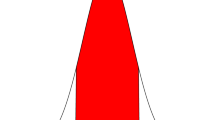Abstract
Analysis of transcripts of interviews with children aged 10 to 12, focused on a mathematical task designed to provoke prediction and generalisation, reveals a category of words (called hedges) associated with uncertainty. It is argued that these words — examples includeabout, around, maybe, think — are frequently deployed as a ‘Shield’ against accusation of error. The analysis draws on linguistic frameworks for categorising types of hedge, and for a theoretical account of how they might succeed in conveying uncertainty to listeners.
Similar content being viewed by others
References
Ainley, J.: 1988, ‘Perceptions of teachers' questioning styles’, in Bourbàs, A. (ed.),Proceedings of the Twelfth International Conference for the Psychology of Mathematics Education, Vezprém, Hungary, Ferenc Genzwein, OOK, Vol. 1, pp. 92–99.
Balacheff, N.: 1988, ‘Aspects of proof in pupils' practice of school mathematics’, in Pimm, D. (ed.),Mathematics, Teachers and Children. Hodder and Stoughton, London, pp. 216–235.
Brockway, D.: 1981, ‘Semantic constraints on relevance’, in Parrett, H., Sbisa, M. & Verschueren, J. (eds),Possibilities and Limitations of Pragmatics: Proceedings of the Conference on Pragmatics at Urbino, July 8–14, 1979, Benjamins, Amsterdam, pp. 57–78.
Buxton, L.: 1981,Do You Panic about Mathematics?’, Heinemann, London.
Channell, J. M.: 1980, ‘More on approximations’,Journal of Pragmatics 4, 461–476.
Channell, J. M.: 1985, ‘Vagueness as a conversational strategy’,Nottingham Linguistic Circular 14, 3–24.
Channell, J. M.: 1990, ‘Precise and vague quantities in writing in economics’, in Nash, W. (ed.),The Writing Scholar: studies in the language and conventions of academic discourse, Sage Publications, Beverley Hills, pp. 95–117.
Channell, J. M.: 1994,Vague Language, Oxford University Press, Oxford.
Clayton, J.: 1992,Estimation in Schools, Unpublished M. Phil. thesis, University of London.
Cobb, P., Yackel, E. and Wood, T.: 1992, ‘Interaction and learning in mathematics classroom situations’,Educational Studies in Mathematics 23, 99–122.
Freudenthal, H.: 1978,Weeding and Sowing, D. Reidel, Dordrecht.
Ginsburg, H.: 1981, ‘The clinical interview in psychological research on mathematical thinking: aims, rationales, techniques’,For the Learning of Mathematics 1(3), 4–11.
Grice, H. P.: 1975, ‘Logic and conversation’, in Cole, P. and Morgan, J. L. (eds),Syntax and Semantics: Vol. 13 Speech acts, Academic Press, New York, pp. 41–58.
Grice, H. P.: 1989,Studies in the Way of Words, Harvard University Press, Cambridge.
Labov, W.: 1970, ‘The study of language in its social context’,Studium Generale 23, 30–87.
Lakoff, G.: 1972, ‘Hedges: a study in meaning criteria and the logic of fuzzy concepts’,Chicago Linguistic Society Papers, Chicago Linguistic Society, Chicago, pp. 183–228.
Lakoff, R.: 1973, ‘Questinable answers and answerable questions’, in Kachru, B. B.et al. (eds),Issues in Linguistics: Papers in Honor of Henry & Renée Kahane, University of Illinois Press, Urbana, pp. 453–467.
Levinson, S. C.: 1983,Pragmatics, Cambridge University Press, Cambridge.
Mason, J.: 1988,Learning and Doing Mathematics, Macmillan, London.
Mason, J. and Pimm, D.: 1984, ‘Generic examples: seeing the general in the particular’,Educational Studies in Mathematics 15, 277–289.
Pimm, D.: 1992, ‘Classroom language and the teaching of mathematics’, in Nickson, M. and Lerman, S. (eds),The Social Context of Mathematics Education: theory and practice, South Bank University, London, pp. 67–81.
Prince, E. F., Frader, J. and Bosk, C.: 1982, ‘On hedging in physician-physician discourse’, in di Pietro, R. J. (ed.),Linguistics and the Professions, Ablex, Norwood, pp. 82–96.
Rowland, T.: 1992, ‘Pointing with pronouns’,For the Learning of Mathematics 12(2), 44–48.
Rowland, T.: (unpublished), ‘Children conveying uncertainty in estimation tasks’, Available from Homerton College, Cambridge.
Schiffrin, D.: 1987,Discourse Markers, Cambridge University Press, Cambridge.
Sperber, D. and Wilson, D.: 1986,Relevance: Communication and Cognition, Basil Blackwell, Oxford.
Stubbs, M.: 1986, ‘A matter of prolonged fieldwork: notes towards a modal grammar of English’,Applied Linguistics 7(1), 1–25.
Wood, D. J., Bruner, J. S. and Ross, G.: 1976, ‘The role of tutoring in problem solving’,Journal of Child Psychology and Psychiatry 17 (2), 89–100.
Zadeh, L.: 1965, ‘Fuzzy Sets’,Information and Control 8, 338–353.
Author information
Authors and Affiliations
Rights and permissions
About this article
Cite this article
Rowland, T. Hedges in mathematics talk: Linguistic pointers to uncertainty. Educ Stud Math 29, 327–353 (1995). https://doi.org/10.1007/BF01273910
Issue Date:
DOI: https://doi.org/10.1007/BF01273910




